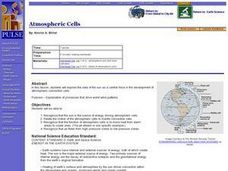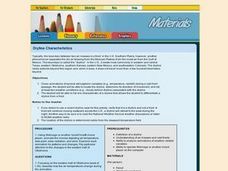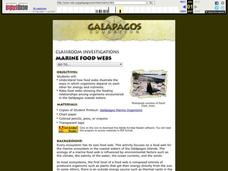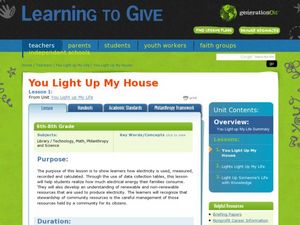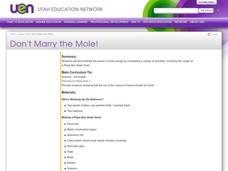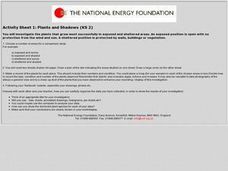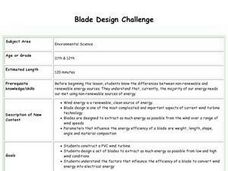K12 Reader
Extreme Weather
Thunderstorms, tornados, blizzards, hurricanes. These extreme forms of weather are the focus of an article on a two-part reading comprehension worksheet. After reading the passage, kids use information in the text to respond to a series...
K12 Reader
Extreme Weather
What is thunder? After reading a short article about extreme weather, middle schoolers must use information in the text to explain this weather phenomenon.
Curated OER
Driving Currents
Students conduct a variety of investigations to see how water, heat, and salinity affect the flow of the world's ocean currents,as well as, explore many factors that affect the flow of the world's ocean currents. They also describe in...
Curated OER
Atmospheric Cells
Pupils recognize that the sun is the source of energy driving atmosphere cells. They relate the motion of the atmospheric cells to mantle convection cells. Students recognize that the function of atmospheric cells is to move heat from...
Curated OER
Climate Patterns across the United States
Students articulate differences between climate and weather using examples in a written statement. Using climate data from across the country, they describe climate patterns for various parts of the United States on a map. Students...
Curated OER
Dryline Characteristics
Students view animations of several atmospheric variables (e.g., temperature, rainfall) during a cold front passage and locate the dryline, determine its direction of movement, and list at least two weather conditions associated with the...
Curated OER
Reading Weather Maps
Fourth graders the symbols that are used on weather maps. They develop five day forecasts based on information they gather from weather maps in the newspaper and on the Internet.
Curated OER
What is Climate?
In this climate worksheet, students review the components that make up climate including temperature and precipitation. This worksheet has 8 true or false and 2 short answer questions.
Curated OER
(S-1) Sunlight and the Earth
Students discuss the solar heating of the Earth and atmosphere, its heat loss proceses, and the way these relate to weather and climate.
Curated OER
Marine Food Webs
Students examine how food webs illustrate the ways in which organisms depend on each other for energy and nutrients, and make food webs showing the feeding relationships among organisms encountered in the Gal??pagos coastal waters.
Curated OER
A Tall Ship and a Star to Steer Her By
Young scholars create a water transportation device powered by wind. In this wind power lesson, students research transportation concepts after reading the poem "Sea Fever" by John Masefield. Young scholars design the fastest sailboat...
Curated OER
You Light Up My House
Students explore renewable and nonrenewable resources. In this electricity lesson plan, students consider way to reduce the energy that they use as they chart and analyze their own electricity usage.
Curated OER
Sky and Cloud Windows
Students monitor the weather, clouds, and sky. In this weather lesson, students create a sky and cloud window to focus their sky observations. They write observations in a notebook and include the date, time, cloud cover, types of...
Curated OER
Summarizing
Students analyze and summarize the main aspects of a news story. They find the "Who, What, Where, When and Why in a particular news story.In addition, they answer six questions over a particular story and then write a news story from...
Curated OER
Ocean Water and Life
For this ocean water and life worksheet, students match the vocabulary term with the correct definition. Also, students answer questions by deciding if the statements are true or false. Finally, students complete concepts maps while...
Curated OER
Immersion Presents Monterey Bay
Young scholars study Monterey Bay. In this Monterey Bay lesson plan, students create a model of upwelling around Monterey Bay. Young scholars simulate surface water movement relative to prevailing winds.
Curated OER
Food Webs
Students recognize interdependence in a food web by using yarn and notecards to create a food web and discussing what would happen if one of the organisms from a certain trophic level is removed.
Curated OER
Don't Marry the Mole!
Third graders demonstrate the power of solar energy by completing a variety of activities, including the creation of a Pizza Box Solar Oven.
Curated OER
Prairie Tic-Tac-Toe
In this prairie organisms worksheet, 8th graders name the role of 18 prairie organisms and tell if they are a biotic or abiotic factor. The organisms include plants and natural forces such as wind and fire.
Curated OER
How Do You Dew?
Students examine how the processes of condensation and evaporation occur. They describe the relationship between heat energy, evaporation and condensation of water on Earth. They give examples of the processes of evaporation and...
Curated OER
Worksheet 6. Which Word Belongs?
In this word group worksheet, students write the word from the word pool that belongs in each word group. There are 10 word groups on this page to complete.
Curated OER
Which Word Belongs?
In this categorizing words activity, students read a series of three words and determine what they have in common. From a word list, students write the word that belongs in each group. There are ten questions.
Curated OER
Plants and Shadows
In this science worksheet, students design an experiment to measure the effects of sunlight exposure upon plants while comparing the amount of shade as a correlation.
Curated OER
Blade Design Challenge
Students identify the differences between non-renewable and renewable energy sources. They construct a PVC wind turbine and design a set of blades to extract as much energy as possible from low and high wind conditions.





